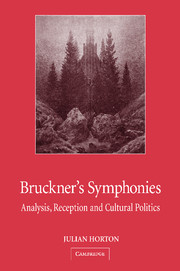Book contents
- Frontmatter
- Dedication
- Contents
- Preface
- 1 Introduction: the critical problem
- 2 Bruckner and late nineteenth-century Vienna: analysis and historical context
- 3 Right-wing cultural politics and the Nazi appropriation of Bruckner
- 4 Bruckner and musical analysis
- 5 Bruckner and the construction of musical influence
- 6 Analysis and the problem of the editions
- 7 Psychobiography and analysis
- 8 Epilogue: Bruckner and his contexts
- Bibliography
- Index
8 - Epilogue: Bruckner and his contexts
Published online by Cambridge University Press: 22 September 2009
- Frontmatter
- Dedication
- Contents
- Preface
- 1 Introduction: the critical problem
- 2 Bruckner and late nineteenth-century Vienna: analysis and historical context
- 3 Right-wing cultural politics and the Nazi appropriation of Bruckner
- 4 Bruckner and musical analysis
- 5 Bruckner and the construction of musical influence
- 6 Analysis and the problem of the editions
- 7 Psychobiography and analysis
- 8 Epilogue: Bruckner and his contexts
- Bibliography
- Index
Summary
The aim of this study has categorically not been simply to set up and resolve various components of the ‘Bruckner problem’ one after the other, as if these problems, and in fact those accruing to the life and work of any composer, simply dissolve under interdisciplinary scrutiny. Neither has it been to assert that such matters are in all cases irremediable except from an interdisciplinary, or broadly critical, perspective. Rather, it has been to point out the benefit to our understanding of Bruckner's symphonies of allowing them to act as the focus for a variety of methodological debates. This responds to a fundamental tendency to perceive contentious issues as methodologically self-contained: the idea that editorial and textual dilemmas demand exclusively philological solutions, or that biographical clichés will disperse if the appropriate biographical evidence is marshalled. It may, instead, be productive to view such problems as points of disciplinary convergence: editorial disagreements arise as much from analytical perceptions or from trends in reception history as they do from textual difficulties; biography becomes entangled in hermeneutic, analytical or historical agendas.
Developing this approach has involved maintaining a dual perspective. On the one hand, wide-ranging methodological debates have been engaged as vehicles for conceptualising Bruckner's music.
- Type
- Chapter
- Information
- Bruckner's SymphoniesAnalysis, Reception and Cultural Politics, pp. 258 - 265Publisher: Cambridge University PressPrint publication year: 2004



